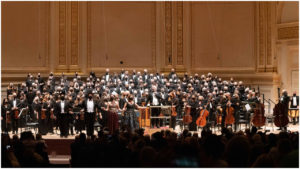
Oratorio Society of New York 2021-22 Review: Händel’s ‘Messiah’
A Message of Hope in Times of Great Difficulties
By Logan MartellOn December 20, 2021, the Oratorio Society of New York returned to Carnegie Hall for its annual performance of Händel’s “Messiah,” a tradition which the organization has kept since 1847.
The evening’s concert, dedicated to the memory of company artist and board member Marie Gangemi, was comprised of the first part of the oratorio, with selections from Parts II and III. The soloists, choir, and orchestra, under the direction of renowned conductor Kent Tritle, put on a faithful, and indeed praiseworthy performance of this perennial work.
Four Wonderful Soloists
The four soloists of the evening were drawn from the finalists of the Lyndon Woodside Oratorio-Solo Competition, a recent practice which is also becoming a company tradition. The soloists were soprano Leslie Fagan, contralto Heather Petrie, tenor Joshua Blue, and baritone Sidney Outlaw.
Following the lush and stately opening Sinfonia, Blue’s first recitative “Comfort ye my people,” carried with great warmth as he exchanged phrases with the string section in its opening. The relaxed, melismatic approach took on a firmer delivery with the phrase “prepare ye the way of the Lord,” as he readied for the aria “Ev’ry valley shall be exalted.” Blue later returned onstage during the Part III duet “O death, where is thy sting?” where his refined tenor wonderfully complimented Petrie’s rich alto as they worked their way through the contrapuntal phrases.
The next soloist was Outlaw, with his recitative “Thus saith the Lord of Hosts,” providing a fine contrast between his strongly-rooted baritone and the text which speaks of great upheaval. These qualities swelled powerfully for his later part I numbers “For behold, darkness shall cover the earth,” and “The people that walked in darkness have seen a great light.” Through his numbers, Outlaw displayed a deft balance between the sung and narrative aspects of the text, lacking in neither clarity nor emotional imbuement.
The third soloist heard was Petrie, who was given the aria “But who may abide the day of His coming.” She retained her highly-pleasing tones as she alternated between the legato and staccato-like phrases, backed by the great energy in the strings’ tremolo. While her distance from the microphone led to a moment or two during softer sections where I wondered if her voice could be heard by those in the more distant seats, Petrie nonetheless delivered this number with great vocal allure and capped it off with a gorgeous cadenza.
Last, and by no means least, was Fagan, whose consecutive numbers comprised the bulk of the concert’s middle section, and were handled with grace and sonority. Her aria “Then shall the eyes of the blind be opened,” featured a gossamer sustaining in her lower register which wonderfully accented the phrase “He shall speak peace to the heathen” before the da capo. She was given the last solo number of the evening with “If God be for us, who can be against us,” where her tender reassurances were both pious and remarkably touching.
A Thing of Majesty
Between these compelling numbers was the of the company’s chorus, whose union of voices combined into a thing of majesty, which even the slight dampening of their masks did little to mar. They delivered their selections with great rejoicing and tight execution, qualities which were exemplified with the iconic “Hallelujah” chorus, where their triumphant, praising measures were brought out all the more by the prominent drums and trumpet.
Monday’s concert made for a splendid return of the company to Carnegie Hall, with which the Oratorio Society of New York holds a special relationship since their time under fifth president Andrew Carnegie. While the work was not presented in its entirety, the selections still managed to powerfully relate the messages of birth, death, redemption, and overcoming in a way that few others can.
With the threat of the Omicron variant continuing to close theaters and downsize audiences worldwide, the future of the performing arts will remain in a precarious state over the next few months as companies reassess and grapple with the unseen danger. Yet, it is within moments such as these where the importance, and one could even argue the necessity, of such performances to bring people’s hearts together for an evening of musical praise and exultation, becomes abundantly clear.
For such an oft-performed oratorio, this concert powerfully affirmed that, even in the face of death, tradition endures, faith endures, and music endures.




